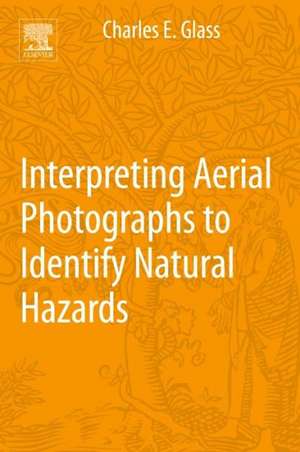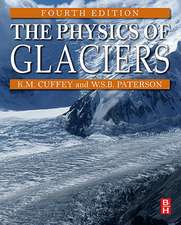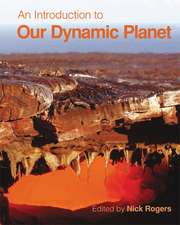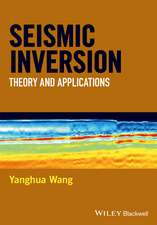Interpreting Aerial Photographs to Identify Natural Hazards
Autor Charles E. Glassen Limba Engleză Paperback – 22 aug 2013
Whether they are related to natural terrain, geology, vegetation, hydrology or land use patterns – it’s critical for you to be able to recognize dangerous conditions when and where they exist. Failure to adequately recognize and characterize geomorphic, geologic, and hydrologic dangers on the ground using aerial photography is one of the major factors contributing to due to natural hazards and disasters, damage to architectural structures, and often the subsequent loss of human life as a result. Aerial photographs provide one of the most prevalent, inexpensive and under-utilized tools to those with the knowledge and expertise to interpret them.
- Authored by one of the world’s experts in aerial photography and remote sensing, with more than 35 years of experience in research and instruction
- Features more than 100 color photographs to vividly explore the fundamental principles of aerial photography
- Chapter tables underscore key concepts including channel size and shape characteristics, image scales, reverse fault values, and strike-slip fault systems
Preț: 226.18 lei
Preț vechi: 291.63 lei
-22% Nou
Puncte Express: 339
Preț estimativ în valută:
43.28€ • 46.28$ • 36.09£
43.28€ • 46.28$ • 36.09£
Carte tipărită la comandă
Livrare economică 10-24 aprilie
Preluare comenzi: 021 569.72.76
Specificații
ISBN-13: 9780124200180
ISBN-10: 0124200184
Pagini: 184
Ilustrații: black & white illustrations, colour illustrations, black & white line drawings, colour line drawings, black & white tables, figures
Dimensiuni: 152 x 229 x 10 mm
Greutate: 0.32 kg
Editura: ELSEVIER SCIENCE
ISBN-10: 0124200184
Pagini: 184
Ilustrații: black & white illustrations, colour illustrations, black & white line drawings, colour line drawings, black & white tables, figures
Dimensiuni: 152 x 229 x 10 mm
Greutate: 0.32 kg
Editura: ELSEVIER SCIENCE
Public țintă
Students, scientists, and engineers, real estate executives, developers, construction personnel, land use planners, lawyers, archaeologists, federal, state, and local policy makers and regulatorsCuprins
Part 1. Establishing Baselines – Look for the Butterfly
Chapter 1 Getting Started Chapter 2 More About Photographs than You Ever Cared to KnowChapter 3 Textural InformationChapter 4 Color Information
Part 2. Recognizing Hazards on the Ground
Chapter 5 Dangers from Earthquakes and FaultsChapter 6 Dangers from LandslidesChapter 7 Dangers from FloodsChapter 8 Dangers from Ground Subsidence
Part 3 Spectral Ranges Beyond Visible
Chapter 9 The Ultraviolet RegionChapter 10 The Near Infrared RegionChapter 11 The Thermal Infrared RegionChapter 12 The MicrowaveChapter 13 Obtaining Aerial Photographs
Chapter 1 Getting Started Chapter 2 More About Photographs than You Ever Cared to KnowChapter 3 Textural InformationChapter 4 Color Information
Part 2. Recognizing Hazards on the Ground
Chapter 5 Dangers from Earthquakes and FaultsChapter 6 Dangers from LandslidesChapter 7 Dangers from FloodsChapter 8 Dangers from Ground Subsidence
Part 3 Spectral Ranges Beyond Visible
Chapter 9 The Ultraviolet RegionChapter 10 The Near Infrared RegionChapter 11 The Thermal Infrared RegionChapter 12 The MicrowaveChapter 13 Obtaining Aerial Photographs
Recenzii
"…the most practical and authoritative reference available for any professional or student looking for a reference on how to recognise, analyse, interpret and avoid – or successfully plan for – dangerous contingencies…Aerial photographs provide one of the most prevalent, inexpensive and under-utilised tools to those with the knowledge and expertise to interpret them." --GeoQ, March 2014
"This guide describes the interpretation of aerial photos to identify natural hazards on the ground. It explains how to use the sun to illuminate targets, read an aerial photo, make accurate measurements on these photos and understand three-dimensional viewing, read textural information like stream patterns and gully analysis, and read color information. It goes on to detail how to recognize dangers from earthquakes and faults, landslides, floods, and ground subsidence;…" --ProtoView.com, February 2014
"This guide describes the interpretation of aerial photos to identify natural hazards on the ground. It explains how to use the sun to illuminate targets, read an aerial photo, make accurate measurements on these photos and understand three-dimensional viewing, read textural information like stream patterns and gully analysis, and read color information. It goes on to detail how to recognize dangers from earthquakes and faults, landslides, floods, and ground subsidence;…" --ProtoView.com, February 2014













